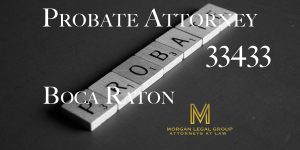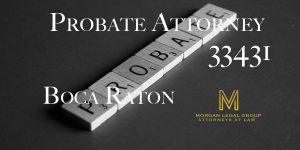Probate in Florida: Navigating the Legal Landscape
The death of a loved one can be a difficult time, and the probate process can add to the confusion and uncertainty. In Florida, the probate process has unique characteristics, and understanding them is crucial for those planning their estates and those tasked with executing them.
The Probate Process Unveiled
Probate is the court-supervised process of authenticating a last will and testament if the deceased had one. It involves locating and determining the value of the person’s assets, paying final bills and taxes, and distributing the remainder of the estate to the rightful beneficiaries. In Florida, the process follows a set of steps:
1. Initiating the Probate
The process typically begins when the executor named in the will, or an interested party if there’s no will, files a petition with the probate court. This court is usually in the county where the deceased person lived at the time of their death.
2. Authenticating the Will
If there’s a will, the court needs to verify its authenticity. This is usually a straightforward process but may involve witnesses or other forms of evidence to ensure the document’s legitimacy.
3. Appointing the Personal Representative
The court appoints a personal representative (executor) to manage the probate process. This person is often named in the will, but the court makes the official appointment.
4. Identifying and Valuing Assets
The personal representative identifies, gathers, and appraises the decedent’s assets. This includes everything from real estate and bank accounts to personal possessions.
5. Paying Debts and Taxes
Outstanding debts and taxes must be paid from the estate. This includes notifying creditors and in some cases, publishing a notice to potential claimants in a local newspaper.
6. Distributing Assets to Beneficiaries
After settling debts and taxes, the remaining assets are distributed to the beneficiaries as the will outlines. Florida’s intestate succession laws dictate the distribution if there’s no will.
Probate in Florida: Unique Aspects
Florida’s probate laws have some distinctive features that individuals should be aware of:
1. Homestead Property
Florida has specific rules regarding homestead property, which is a primary residence protected from forced sale under most circumstances. The process of transferring or selling homestead property may have additional requirements in probate.
2. Formal vs. Summary Administration
Florida offers two types of probate administration: formal and summary. The choice between them depends on factors such as the value of the estate and the time elapsed since the decedent’s passing.
3. Elective Share for Surviving Spouse
Florida law gives a surviving spouse the right to claim an elective share of the deceased spouse’s estate, regardless of what the will specifies. This elective share is intended to prevent a spouse from being disinherited.
The Role of Morgan Legal Group
At Morgan Legal Group in Miami, we understand the intricacies of probate law in Florida. Our team of experienced probate attorneys is dedicated to guiding our clients through the complexities of the probate process with care and efficiency.
Whether you are planning your estate and want to understand how to structure it to minimize probate complexities or you find yourself in the position of managing a loved one’s estate, we are here to assist you. Our tailored legal advice ensures that your unique circumstances are considered, and we work diligently to achieve the best outcomes for our clients.
Navigating Probate in Florida: A Summary
The probate process in Florida can be complex and overwhelming. To help you understand the process, here is a summary of the steps involved:
| Step | Description |
|---|---|
| 1. Initiating the Probate | The process typically begins when the executor named in the will, or an interested party if there’s no will, files a petition with the probate court. |
| 2. Authenticating the Will | If there’s a will, the court needs to verify its authenticity. |
| 3. Appointing the Personal Representative | The court appoints a personal representative (executor) to manage the probate process. |
| 4. Identifying and Valuing Assets | The personal representative identifies, gathers, and appraises the decedent’s assets. |
| 5. Paying Debts and Taxes | Outstanding debts and taxes must be paid from the estate. |
| 6. Distributing Assets to Beneficiaries | After settling debts and taxes, the remaining assets are distributed to the beneficiaries as the will outlines. |
Probate in Florida: Unique Aspects
Florida’s probate laws have some distinctive features that individuals should be aware of:
1. Homestead Property
Florida has specific rules regarding homestead property, which is a primary residence protected from forced sale under most circumstances. The process of transferring or selling homestead property may have additional requirements in probate.
2. Formal vs. Summary Administration
Florida offers two types of probate administration: formal and summary. The choice between them depends on factors such as the value of the estate and the time elapsed since the decedent’s passing.
3. Elective Share for Surviving Spouse
Florida law gives a surviving spouse the right to claim an elective share of the deceased spouse’s estate, regardless of what the will specifies. This elective share is intended to prevent a spouse from being disinherited.
The Role of Morgan Legal Group
At Morgan Legal Group in Miami,








